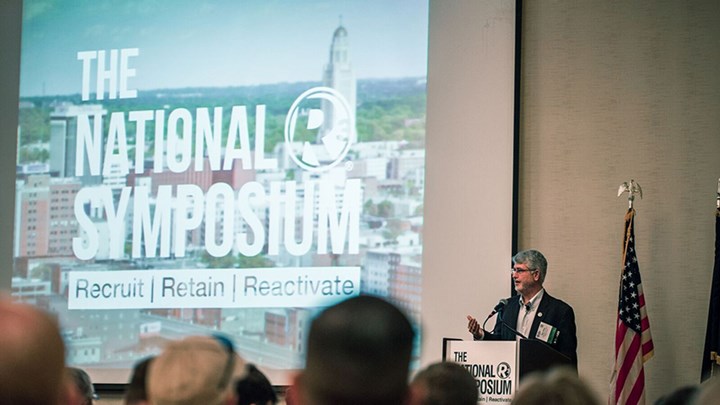
by Chris Chaffin - Tuesday, October 30, 2018

In May 2018, some 320 individuals representing more than 40 states and 100 different organizations attended the first-ever R3 (Recruitment, Retention and Reactivation) Symposium in Lincoln, NE. The purpose: “Provide a venue for partners focused on the growth of hunting, angling, target shooting and boating partners—collectively referred to as the outdoor community—to gather, strategize and ultimately accelerate the current state of national efforts to recruit, retain and reactivate participants in outdoor recreation.” Symposium organizers called response to the symposium “overwhelmingly positive” as the event provided an unparalleled opportunity for agencies, industries and NGOs (non-governmental organizations) to share, learn and develop opportunities to accelerate current R3 efforts.
Samantha Pedder, director of business development for the Council to Advance Hunting and the Shooting Sports (Council), noted that as a community, our collective goal is to increase participation in outdoor recreation. A process to reach such a lofty goal requires not only the dedication of significant resources, she said, but also “a steadfast commitment to reviewing and adjusting the way the community manages some of its most valuable resources—the participants themselves.”
Symposium attendees participated in facilitated work sessions examining Business Practices of the 21st Century and how to evaluate the impact of R3 efforts through “strategic partnerships,” as well as how to most effectively continue a centralized national effort. The symposium also created the “opportunity for all four state fish and wildlife agency regional R3 committees to meet simultaneously and identify areas of significant need to advance R3 efforts at the state and regional level.” In moving forward, the Council established that it will work with those regional committees to prioritize the identified needs and then begin to facilitate opportunities to address them.
As outlined in a symposium report, work sessions and R3 Regional Committee meetings identified the following three closely related themes as points to focus on in developing future R3 strategies.
Regional R3 committees also identified different areas of need to promote the success of R3 efforts, including: Institutionalize R3 and Develop Organizational Buy-In; Marketing, Evaluation and Research; Mentoring and Training New Participants; and Partnerships and Regional Structure.
In addition, organizations focused on mentoring new outdoor participants met to share information and updates on their respective programs. They discussed the ongoing need for mentors and identified areas of focus for future mentoring efforts.
Symposium Conclusions
It was noted that future R3 efforts and events should consider the themes as well as regional needs as they may represent the next immediate challenges organizations will face in advancing R3. Attendees’ comments demonstrated that there is much work to be completed by R3 professionals and the collective conservation and outdoor recreation-based community if it is to increase participation in outdoor recreation.
In a post-symposium survey, 50 percent of attendees felt the symposium “achieved” its first three objectives, including: understanding the current status of R3 efforts, identifying current R3 challenges and strengthening R3 partnerships. The fourth objective, covering enhanced efforts and the implementation of strategies to address current R3 challenges (such as learning to evaluate programs and better understand an element of the National R3 Plan) received a 43 percent rating. This indicated to symposium organizers that there is “opportunity for future events and conferences to expand on the tactical and ‘how to’ aspects of R3.”
Like so many other conservation challenges, rebuilding the population of, and support for, the American hunter will not be easy or fast. However, the focus given to the need for a stronger future for hunting and hunters by the collective participants and organizations at the R3 Symposium bodes well for the outdoor community and industry. And because the effort will be challenging, sportsmen and women once again will be vital cogs in the wheel of change. We all need to be committed and involved.
Editor's Note: Photo courtesy of the Council to Advance Hunting and Shooting Sports
About the author: Chris Chaffin has been an outdoor communicator, educator and partnership manager for more than 40 years. On the national scene he has represented several prominent companies in the outdoor community and served two terms as treasurer of the Professional Outdoor Media Association (POMA), eventually taking on the roles of vice-president, president and chairman of the board. In 2007, he launched Chaffin Communications, Inc., a communications consulting company focusing on the outdoors. In 2012, with support from the Outdoor Adventure Dream Giveaway, Chaffin founded and currently manages the Outdoor Adventure Conservation Fund, a Florida non-profit established to encourage and facilitate more people participating in traditional outdoor activities.
E-mail your comments/questions about this site to:
[email protected]
